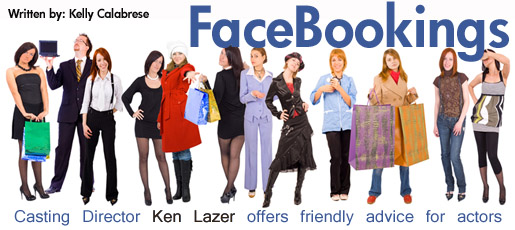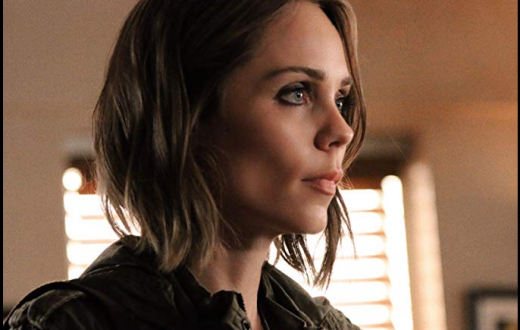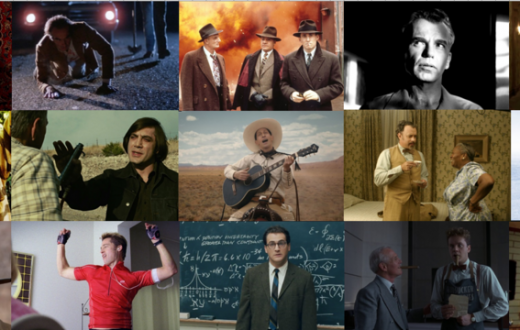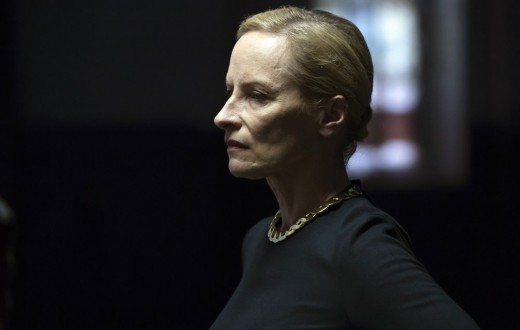Auditioning has a great deal to do with the art of social networking. Everything in an audition sends a message and builds a profile in the mind of the casting director. The more you know, the larger potential you have to grow. So, NYCastings sought the insight of a CD with nearly 20 years of professional experience and a generous nature when it comes to offering top news and recent insight to actors on his company’s Facebook…
Meet Casting Director Ken Lazer.
Currently the owner of Ken Lazer Casting, Ken has cast hundreds of national, regional and local television commercials, webisodes, infomercials, industrials, print projects and voice-overs. The industry knows him for his attention to detail and actors know Ken for his friendly, welcoming personality and insightful direction, making them feel relaxed and able to enjoy the audition process in a supportive environment.
To get the status on Ken Lazer’s casting knowledge and advice for actors – You’re Invited to this info packed Q & A with him…
Q: You give on-going advice to actors on your Facebook page. Why? (besides for helping to lessen the scary image of CDs, naturally:)
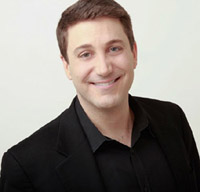 I’ve been doing this for nearly 20 years and have seen too many times the actors that come in feeling nervous and not prepared for an audition. There are a large number of actors in the non-union market who are new to this business and unfortunately do not have any on-camera training. I’ve had actors come in for a casting who don’t know what a slate is. So, I started my Facebook page to give actors some helpful tips and tools that may improve their auditions.
I’ve been doing this for nearly 20 years and have seen too many times the actors that come in feeling nervous and not prepared for an audition. There are a large number of actors in the non-union market who are new to this business and unfortunately do not have any on-camera training. I’ve had actors come in for a casting who don’t know what a slate is. So, I started my Facebook page to give actors some helpful tips and tools that may improve their auditions.
Q: You mention on your Facebook page that an actor should plant their feet and not rock during an audition because the rocking makes them look weak. What are some other tell tale signs of a nervous auditioner?
 Right. This happens with actors that are new to this business and/or don’t have proper on-camera training. Sometimes an actor will shift their weight, blink their eyes a bit too much, lick their dry lips. Those are the most common ones.
Right. This happens with actors that are new to this business and/or don’t have proper on-camera training. Sometimes an actor will shift their weight, blink their eyes a bit too much, lick their dry lips. Those are the most common ones.
Q: I know (From your FB page) that you are a big believer in reels. How long should a reel be? Any tips on what to avoid?
The average attention span of watching these reels is 10 – 15 seconds. So you want to make sure you have a creative way of showing your best work. Always put the most recent commercials first and edit them together in chronological order. I wouldn’t make a reel any longer than 90 – 120 seconds. We don’t have a lot of time to sit through 3 – 5 minute reels.
Q: What level of influence does the CD have?
Usually very little influence. It is the CD’s job to present a casting session of the best talent for whatever characters our client (Production Company/Ad Agency) is looking to hire. After our client reviews the casting session, they make their select choices and present them to their client (the Product Company). From there, the choices are narrowed down and eventually a final choice is made. It’s very rare when our client will ask us to choose who they should book.
Q: If a job says it shoots on a certain day, how often does that stick? – I ask because actors can usually tell if they didn’t get a gig by – when the shoot date passes by.
When it comes to commercials and shoot dates, when there is a known shoot date, 99% of the time that date sticks. There are thousands of dollars involved when a studio or location is reserved for a shoot date. Producers will make sure to stick to a schedule so they don’t lose that money.
Q: On your website, you present some sample casting sessions with two takes. Do you send in both?
It depends upon the casting. Sometimes, I only need to do one take. Other times, if I do a second take it’s either because I’ve given the actor some kind of direction to help their performance and it shows my client that the actor can take direction; or even if the first take is good and the framing is 3/4 or waist up, then I like to do a 2nd take a bit tighter/closer up.
Q: How long is the audition clip that the producer / client sees?
Again, this depends upon the casting and how much copy there is (if any) and how many takes are recorded.
Q: How many actors do you typically show to the client, percentage wise, out of those who audition?
When I prep a session, I know who I want to present to my client. I like to bring in the best talent in a particular category. However, I always like to give fresh faces an opportunity to audition. Sometimes those fresh faces turn out to do a great audition, but sometimes they don’t. I don’t like to take actors off of a session—it’s very rare that I do. However, I can’t show my client someone who just isn’t cutting it. So percentage wise, I would say I show 97% of the actors that audition on a casting to my client.
Q: When slating, should an actor show personality or keep it simple?
When slating, it’s always better to keep it real and simple.
Q: On the second slate, how long should an actor hold their focus /body position? It seems as if the tape roles for a while.
Do you mean the end slate when we ask what the actor’s name is one more time? If so, hold it until you know the camera has cut. This could be maybe 2 seconds or more depending upon how many recording devices are being used. Definitely don’t leave your mark until you know for sure all recording devices have been stopped.
Q: Does the camera role in between takes? Catching the actor’s response to the CDs direction?
Great question. I can only speak for myself on this one. When I give direction, I make sure all recording devices are stopped. However, in rare cases on a callback with clients, sometimes the director will want me to keep rolling while he/she is going over direction with an actor. Again, it’s rare.
Q: In those sample sessions (on your site), the camera zooms out to full body, does that always happen?
Again, I can only speak for my sessions. When I’m doing a slate, I like to show my clients a full length shot.
Q: How do CDs keep track of those they liked during the auditions, since you/they often see hundreds?
I have a log sheet that is preprinted ahead of time. This log sheet has the names of all actors that are scheduled to come in to audition. I write some brief notes next to each name that helps me remember at the end of the day who had a good audition.
Q: Why does an audition room sometimes hold up and not let any actors enter for a while? (YES! I want all the secrets of what goes on behind closed doors 😉
This could be any number of reasons. For example, maybe the CD got a message to call the Producer/Director about a possible change in direction or what they are looking for or any other messages that need to be taken care of; or maybe the CD is having a short conversation with an actor; or maybe the CD just needs a 5 minute breather.
Q: Are there seasons where the commercial gigs pick up or wind down?
Yes. Commercial castings slow down during Thanksgiving/Christmas Holiday season and into January. Also, summertime is a slower time. Otherwise, we’re pretty busy during the rest of the year.
Q: How do you, personally, get the best work out of an actor?
I want actors to do well. It’s important to me that an actor is relaxed during the audition process. If an actor is relaxed and open to the direction I’m giving (if they need it—sometimes they don’t need any tweaking), then I’ll give them direction that will make their audition look better. I’m a strong believer that we are a team. If an actor looks good, then I look good to my client. So, I do my best to make actors feel welcomed to my sessions, to put them at ease. I make sure they have the copy in advance (if there is copy) so they can prepare the best they can before coming into the studio.
Q: As a CD with many years of experience, you know to trust your judgment. What advice do you have for actors about trusting their own judgment and making strong choices?
It’s important that the actor listens to the direction the CD gives before the audition. The first take I always allow the actor freedom to make their own choices. Once an actor knows what the scene involves, he/she should have creative freedom to make whatever choices they feel will work. However, if something doesn’t look right or needs tweaking, that’s when I’ll give direction and a second take.
Q: You run a boutique business built on trust, work ethic and keen judgment, what tips do you have for actors on how to best present themselves as a business?
Make sure you are prepared with copy (if there is any), arrive on time (which means before your call time), make sure your appearance (hair, makeup) looks good (unless the character requires that you look like a mess), be nice to the assistant (they are our eyes and ears) and always have a positive attitude.
Q: Looking forward to the fall and 2011 (geez!) – what message would you like to give actors? And what is your view of the industry?
There’s so much I want to share but here are some basics:
1. Try not to get discouraged if you didn’t get a callback or booking. Even if you feel you did a great job maybe the director didn’t think you had the right look. If you were good, we’ll remember you.
2. Have confidence without being cocky. Don’t go into an audition thinking you know it all.
3. Be as prepared as you possibly can be. If not, the next person that auditions after you will be and your audition won’t look so good.
4. When you’re in the waiting room, focus on your audition. Practice what you’re going to do in front of the camera. This is a business, not a social hour. Your competition will be playing with your head to keep you from focusing on your audition. When you arrive to the casting, sign in, make sure you have the copy (if there is any), go to a quiet corner away from your competition and start working.
5. If you have questions, don’t be afraid to ask. We’re here to help make your audition look it’s best. If you don’t have questions, that’s fine too.
6. Finally, always try to keep a positive attitude, be appreciative of what you have and enjoy the audition process.
Become a Friend of Ken Lazer Casting on Facebook…
Thank you, Ken Lazer, for being a friend to the entertainment industry.
– Your insight is greatly appreciated!

